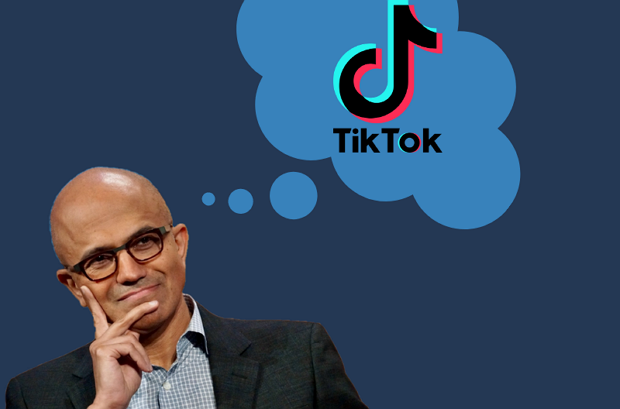
The clock is ticking on TikTok.
With a Sept. 15 deadline looming on the social media sensation, technology pundits are trying to answer a multi-billion dollar question: How much should Microsoft pay?
This is no ordinary acquisition deal, with complexity at nearly every turn.
Microsoft CEO Satya Nadella — who helped orchestrate the $26.5 billion acquisition of LinkedIn in 2016 — has his hands full trying to navigate this one. Not only is Microsoft interested in pieces of ByteDance-owned TikTok, but there is the added stress of negotiating a deal in the midst of political squabble between China and the U.S.
Even more, there’s the technical challenge of transferring the assets, which comes with a pile of security and privacy issues.
It will be a delicate dance for sure. And some are wondering if it’s even worth the effort for Microsoft, a $1.6 trillion company that’s transformed itself in recent years under Nadella by focusing on the boring cloud infrastructure and enterprise software that powers businesses.
So, how much to pay?
CNBC’s David Faber reports that the price tag on TikTok could be between $10 billion to $20 billion — obviously a pretty big range.
A Bloomberg report places the value of TikTok’s U.S. assets — the biggest prize in a Microsoft acquisition — at an even bigger range of $20 billion to $50 billion.
We asked the mergers and acquisitions experts at Seattle-based Cascadia Capital for some additional insight, and they noted that the most comparable company to TikTok is Snap.
Snap went public in March 2017 and closed its first day of trading with a market value of $33 billion, about the same as its current value. At the time, the Santa Monica, Calif.-based photo-sharing service claimed 158 million daily active users.
TikTok’s active user base stands at about 100 million in the U.S., and 800 million globally. Microsoft has said it is looking only to buy TikTok’s business in four countries: Australia, New Zealand, Canada and the U.S.
That would put the valuation on TikTok’s assets close to Snap, or around $33 billion. In fact, Bloomberg reported that ByteDance’s entire business was valued at about $100 billion in May, with estimates that the U.S. TikTok business accounted for about 40% of the company, so $40 billion.
Of course, there are real political threats of a dismal alternative for TikTok in the U.S. — a possible U.S. government ban on the app if it remains tied to Chinese ownership via Beijing-based ByteDance, for example. That is putting downward pressure on the valuation that actually helps Microsoft’s chances, said venture capitalists Ben Gilbert and David Rosenthal, hosts of the popular Acquired podcast.
“TikTok’s negotiating position has weakened significantly since the president threatened to shut the service off in the U.S.” write Gilbert and Rosenthal in an email to GeekWire. “If ByteDance believes that it is possible for that to happen in the future — which is reasonable since it did in India — we could see Microsoft getting a bargain…”
They predict the price will settle in right around $30 billion.
And then there is the bigger question: Why would Microsoft — which announced plans to shut down its Mixer video game streaming service earlier this year — want the headaches associated with TikTok?
There’s constant chatter around that topic in the financial press.
Speaking on CNBC on Tuesday, Zillow co-founder and angel investor Spencer Rascoff noted that he was surprised that Microsoft pursued TikTok.
“I was surprised because the cloud strategy has been so successful for Microsoft in the last couple of years that I didn’t think they’d revert back to this social media envy that they had a number of years ago when they tried to buy Facebook, and then ended up investing in Facebook,” said Rascoff, adding that a TikTok deal could rejuvenate the Microsoft brand and “make the company much cooler.”
He also said the deal could “bail out” the U.S. government, which ultimately could lead to better relations between Microsoft and the federal government.
Meanwhile, Matt Riendeau, a senior vice president at Cascadia Capital, said that the “synergy value is tougher to estimate” on a Microsoft-TikTok tie-up.
“You would need to assess the incremental revenue and cost savings that a specific buyer might realize in (the) combination,” said Riendeau. “LinkedIn has a logical adjacency with Microsoft’s Office 365 product suite, most notably Outlook. To me, TikTok is more tangential to Microsoft, although it is probably complementary with Microsoft’s gaming and search products.”
And then there’s the worry that Microsoft might not be able to defend or grow TikTok’s user base or monetization potential.
“TikTok has less of a moat than Facebook does. If great creators go somewhere else, users will follow — unlike Facebook or Instagram where you stay for your friends,” write Gilbert and Rosenthal. “Microsoft will have to tread very carefully to ensure they hold onto everything that made TikTok successful and ensure they don’t spend all these billions for a deserted neighborhood a few years from now.”



